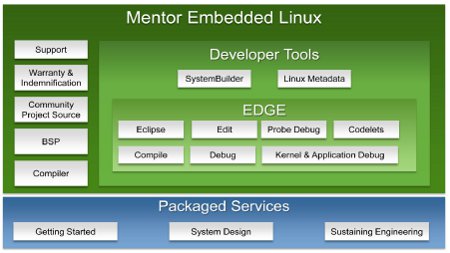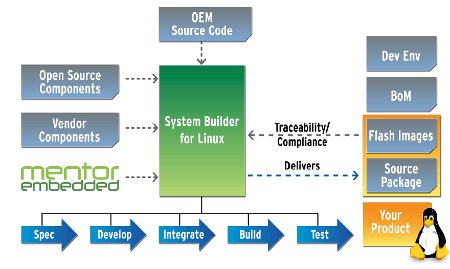Embedded Linux development platform adds PowerPC support
Jun 22, 2010 — by Eric Brown — from the LinuxDevices Archive — 4 viewsMentor Graphics announced a version of its Mentor Embedded Linux development platform that supports Freescale's PowerPC-based QorIQ and PowerQUICC processors. The multicore-ready Mentor Embedded Linux for QorIQ and PowerQUICC includes an Embedded System Builder build engine, an Eclipse-based Mentor Embedded Edge IDE (integrated development environment), and debug tools, says the company.
The new Power Architecture (PowerPC) version of Mentor Graphics' Linux platform was tipped in April, along with similar Freescale Semiconductor partnerships with Enea and Green Hills Software for their OSE and Integrity real-time operating systems (RTOSes), respectively.
Previously available for ARM and MIPS platforms, the Mentor Embedded Linux platform now supports the top-of-the-line eight-core QorIQ P4080, as well as the dual-core QorIQ P2020 system-on-chips. The QorIQ SoCs are the successors to Freescale's PowerQUICC processors, which, like the QorIQs, are based on PowerPC cores and primarily target networking applications.
The Mentor support extends to the PowerQUICC MPC8572 and MPC8377 processors, says the company. In addition, Mentor says it plans to support the Freescale quad-core QorIQ P3041 SoC, as well as the dual-core QorIQ P5020 and single-core P5010 SoCs, all of which were announced earlier today. The latter two P5-family SoCs incorporate a new 64-bit e5500 core that will clock up to 2.5GHz, or 2.2GHz in the case of the current P5 processors, due to ship in volume late 2011.

Mentor Embedded Linux architecture
(Click to enlarge)
The System Builder (see diagram below) is said to produce an Application Developer Kit (ADK), which can be integrated with the Edge IDE or used directly from the command line.

System Builder workflow
(Click to enlarge)
Mentor Embedded Linux provides the latest, stable open source technologies, including updates on new cores, component versions, and defect resolutions twice per year, says Mentor. Consulting services are also said to be provided.
Mentor Embedded Linux background
Embedded Alley had already released its first embedded Linux development platform before the company was acquired by Mentor Graphics last June. The Embedded Alley Development System for Linux was released in December 2008.
In May of last year, the platform was updated with tools to create software Bills of Materials, track open source components, trace binary sources, and help OEMs comply with open source license obligations. The new version also added specific support for Freescale's ARM11-based i.MX31 processor and hardware development kit.
The Embedded Alley team is now part of the Mentor Graphics Embedded Software Division, which spans earlier embedded projects with Mentor Graphics' Nucleus OS RTOS, as well as new Linux and Android technology. The division is said to offer embedded software intellectual property, tools, and consulting services.
Last October, the Mentor Graphics Embedded Software Division announced an Android port to the PowerPC architecture, initially targeting Freescale's PowerQUICC III MPC8536E processor.
Mentor Graphics has continued Embedded Alley's strong relationship with MIPS, as well as with RMI, a manufacturer of MIPS-based processors that was later acquired by NetLogic Microsystems. Prior to being acquired by Mentor a year ago, Embedded Alley announced it had ported Android, previously available only for ARM, to the MIPS architecture.
Last month, Mentor and NetLogic Microsystems announced an agreement to spin a version of Mentor Embedded Linux for NetLogic's MIPS-based XLP, XLR, and XLS multicore SoCs.
Mentor Graphics is also continuing its expansion into ARM development. In November of last year, Mentor released an Android development kit for the Texas Instruments (TI) OMAP35x SoC family. So far, however, Mentor has yet to offer Linux or Android support for Freescale's competing ARM Cortex-A8 i.MX51 or new i.MX535 processors.
A growing partnership
Freescale's Mentor Graphics relationship can be seen as a modest countermove to Intel and Cavium, which separately acquired the top two embedded Linux development platforms last year in picking up Wind River and MontaVista Software, respectively. Today's announcement includes a testimonial quote from Brett Butler, VP and GM of Freescale's Networking Processor Division, that suggests a closer relationship than had been previously implied with Mentor Graphics.
Stated Butler, "Mentor Graphics is our strategic Linux partner based on their exceptional embedded technologies and expertise in open source."
Although the quote suggests that Mentor is Freescale's "go-to-company" for embedded Linux development, in April, Freescale suggested it would pursue additional software development partnerships in the future, although it did not specify whether any of those would be tied to Linux.
Earlier this month, Freescale invested in a not-for-profit engineering firm led by ARM Holdings to develop standardized, open source Linux tools, kernel, and middleware software for ARM-based consumer electronics. The "Linaro" firm is jointly owned by ARM, Freescale, IBM, Samsung, ST-Ericsson, and Texas Instruments, and will initially support ARM Cortex-A tools on distros including Android, LiMo, MeeGo, Ubuntu, and WebOS.
Stated Glenn Perry, GM of Mentor Graphics Embedded Software Division, "Our unified workflow methodology will help our customers develop better products under aggressive time-to-market schedules."
Availability
The Mentor Embedded Linux platform for Freescale QorIQ and PowerQUICC processors will ship in July, says the company. More information may be found here.
This article was originally published on LinuxDevices.com and has been donated to the open source community by QuinStreet Inc. Please visit LinuxToday.com for up-to-date news and articles about Linux and open source.